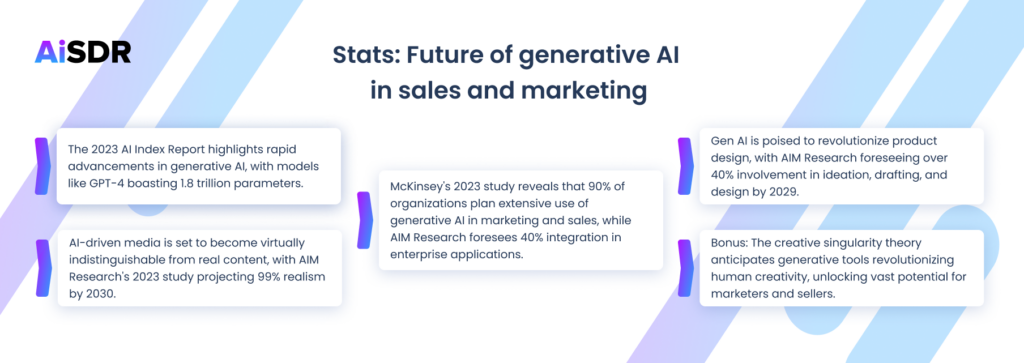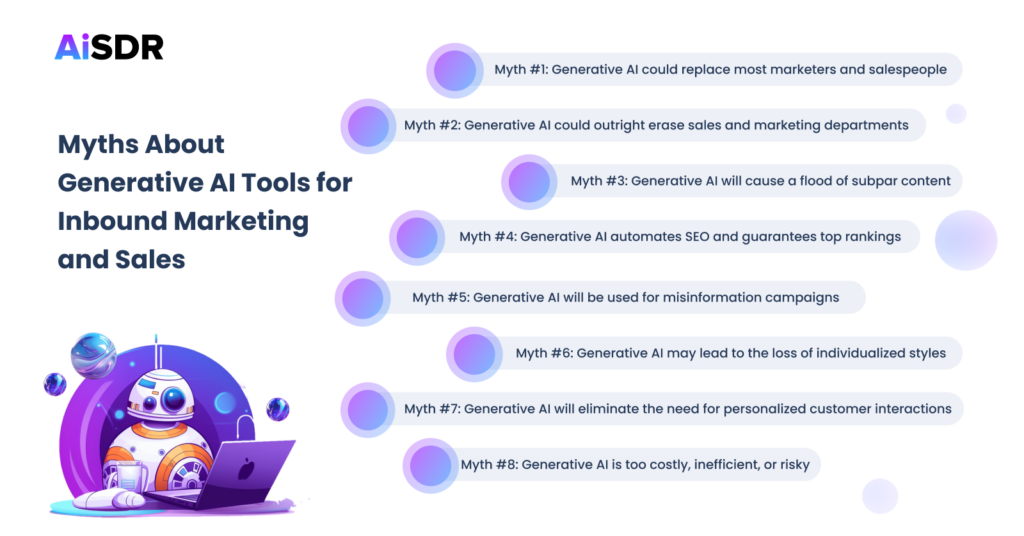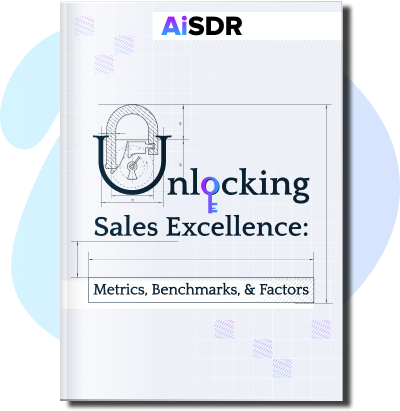Generative AI Tools for Inbound Marketing & Sales: Debunking Myths

Is Gen AI the end of sales as we know it? Is it a panacea to crack Google search? Learn what makes these questions myths
You can’t avoid generative artificial intelligence (AI) if you’re communicating with customers. According to McKinsey’s 2023 report, leading companies already leverage generative AI for inbound marketing and sales.
Generative AI has enormous potential for B2B and B2C customer conversion, advertising, and outreach. Companies can use it to craft better strategies, personalize their efforts, design creative campaigns, and more. However, the rapid rise of generative AI has bred many myths and prejudices.
It’s essential to understand this new tool, which is why we’ll shed light on its capabilities, outline its limitations, and try to figure out how it will evolve.
Current State of Generative AI for Marketing and Sales
AI and marketing have been a great match for a long time, while sales departments turned out to be slow adopters as they prioritized personal connections. Nowadays, both sales and marketing use generative AI to generate text, create images, automate tasks, and forecast results.
According to the AI Marketing 2023 Benchmark Report by Influencer Marketing Hub, 61.4% of marketers and advertisers have already tapped into the power of AI. Over 82% say that AI-generated content is just as good as content created by humans.
McKinsey’s 2023 AI-powered marketing and sales report also shows that using generative AI and machine learning in marketing and sales can enhance customer experiences, drive growth, and improve productivity.
Future of generative AI in sales and marketing
We sifted through current trends and various reports about generative AI. These are the predictions that stand out.

- Generative AI will evolve exponentially: The 2023 AI Index Report by the Stanford Institute shows that generative AI and large language models (LLM) like ChatGPT are getting smarter at increased rates. For example, GPT-2 had 1.5 billion parameters in 2019, while GPT-4 in 2023 is said to operate based on 1.8 trillion parameters.
- AI-generated media drastically improves in quality: The 2023 study by AIM Research predicts that 99% of images and videos will be indistinguishable from real content by 2030.
- Gen AI will be used for new products: Over 40% of product design may involve generative AI in ideation, drafting, and design by 2029 (based on AIM Research predictions).
- Most marketing and sales companies will rely on generative AI: According to McKinsey’s 2023 research, 90% of organizations plan to use generative AI solutions frequently in the next two years. Moreover, AIM Research predicts that 40% of enterprise applications will incorporate this technology.
- We’re close to reaching the creative singularity: The creative singularity theory suggests that generative tools transform human creativity and produce new aesthetics. It also presupposes that the availability of generative AI tools will open creative capabilities among many marketers and sellers.
In addition to real possibilities, the buzz around generative AI has produced many myths we want to debunk.
Debunking Myths About Generative AI Tools for Inbound Marketing and Sales
Generative AI is surrounded by myriad misconceptions about its impact on marketing, sales, and life as we know it. Let’s cut through the confusion by breaking down some of the myths about gen AI in digital marketing.
Myth #1: Generative AI could replace most marketers and salespeople
There’s a widely held concern that gen AI marketing tools may replace many marketers and salespeople. The worries come from the technological capabilities for instant predictions, recommendations, and content generation.
The reality is that generative AI can’t replace human capabilities. Marketers and salespeople rely heavily on creativity, empathy, human connection, and intuition. These are facets that AI has yet to master. Like many AI marketing technologies, generative AI tools will enhance your skills rather than replace you.
“AI, at least in the next 3-5 years, will not reduce headcount nor eliminate jobs. It’s just another tool, not unlike Grammarly or SEMrush, or other tools which help us work smarter and not harder.” — Darryl Praill, CMO at Agorapulse
Although gen AI can take over repetitive tasks, it still requires human oversight to maintain accuracy and quality. Additionally, the successful application of generative AI tools for inbound marketing requires a deep understanding of their capabilities and limitations.
Myth #2: Generative AI could outright erase sales and marketing departments
Another fear is that generative AI may render digital marketing, sales, and search engine optimization (SEO) positions obsolete. However, current technology still faces many constraints.
Gen marketing AI sometimes gives inaccurate answers with a high degree of confidence. The conclusions may contain biases or systematic errors due to discriminatory information or overrepresentation in the training datasets. Companies may need many years of data and instruction-tuning to mitigate these issues in large AI models.
In fact, generative AI could push marketers and salespeople to learn new skills. Generative AI yields the best results when presented with the correct prompts (a skill known as prompt engineering). Not to mention, AI-generated answers need to be validated by human experts from your marketing and sales departments.
Myth #3: Generative AI will cause a flood of subpar content
Some experts believe that generative tools may be used to spam the internet with low-grade content. The concerns come from the ability of tools like ChatGPT for marketing to instantly produce unoriginal blog posts, articles, and sales emails.
With advanced prompt engineering and quality control, generative AI can help craft unique, personalized, resonant content. It also simplifies research and assists in design prototyping, outlining, and drafting. Digital marketers who use AI responsibly for content enhancement and idea generation will be more successful.
Meanwhile, popular search engines have systems in place to combat spam content. For example, Google penalizes content made primarily to manipulate search position rankings.
Myth #4: Generative AI automates SEO and guarantees top rankings
There’s a notion that generative AI could soon handle all aspects of website optimization, ensuring top search engine rankings. The idea is that AI-powered marketing tools may even adapt to changing algorithms, eliminating the need for manual SEO efforts.
This oversimplifies the dynamic nature of SEO. While generative AI can handle mundane tasks like keyword placement or meta-tag creation, technology alone cannot effectively optimize user experience, as that requires aesthetics and intuition.
More importantly, search engines prioritize content that’s helpful, reliable, and high quality. Content creators and designers must follow Google’s E-E-A-T guidance to satisfy the algorithm and readers. Like other aspects of digital marketing, this relies on human creativity, expertise, and intuition.

Myth #5: Generative AI will be used for misinformation campaigns
The concern that generative AI could be misused to spread misinformation and spam is understandable. You might’ve already encountered disinformation news campaigns with fake images and audio recordings done with AI. Some may use generative AI to craft fake comments and testimonials about specific products to boost their popularity.
Luckily, generative AI can also be a powerful tool for combating misinformation. Many visual threat intelligence solutions can already detect deepfakes, fake images, and other synthetic media.
Myth #6: Generative AI may lead to the loss of individualized styles
Machine learning algorithms and LLMs are programmed to follow specific patterns. The models may prioritize particular styles and ideas. This raises concerns that the widespread adoption of gen AI may homogenize the content.
In other words, styles may become more standardized. This could mean a decrease in originality in marketing and sales campaigns.
In reality, AI can enhance the creative process when used correctly. Experienced marketers use generative AI to produce new ideas and rely on their expertise to make final decisions. Additionally, tools like AiSDR let you customize the tone, persuasiveness, and other details to craft the most relevant messages to prospects.
Myth #7: Generative AI will eliminate the need for personalized customer interactions
Another myth is that generative AI can correctly and flawlessly interpret human language. The rapid evolution of LLMs also leads many to believe AI can replace most agents.
While generative AI can hold a conversation, it lacks a nuanced understanding of the context and audiences required to build meaningful relationships. Besides, all generative systems are prone to “hallucinations” (producing irrelevant, inappropriate, and inaccurate messages).
That’s why there is some risk to relying on conversational AI for sales and other critical applications. A much better approach is to use AI as an assistant who can perform routine tasks that don’t require high-level critical thinking. For example, AiSDR can schedule demos with your prospects. Afterward, the sales department must present the solution in the best light considering the prospect’s industry, security requirements, and other needs.
Myth #8: Generative AI is too costly, inefficient, or risky
Some businesses can’t make up their mind about generative AI in marketing and sales. Many believe gen AI hasn’t advanced enough, takes too long to pay off, or that implementing marketing sales automation tools will prove too costly. Others are concerned about the ethics of using AI-generated content, as well as the risks of violating intellectual property rights (generative tools use publicly available works for learning) or data security.
As shown by McKinsey’s research about AI sales and marketing, businesses that invest in generative AI can boost their revenue by 3%-15% while raising their sales ROI by 10%-20%.
On top of that, it’s possible to increase the value of gen AI in mere weeks. You can start by enhancing existing background processes (like letting salespeople generate emails or develop proposals). It’s not always viable to build and train AI models from scratch. Buying an existing AI sales tool lets you minimize expenses and the need for in-house talent.
In addition to these common misconceptions, another belief merits a closer look. This one is not just about marketing and sales but touches the business world and humanity as a whole.
Bonus Myth: Generative AI brings us closer to an AI singularity
“One of the biggest risks to the future of civilization is AI. It is, I think, actually a bigger risk to society than cars or planes or medicine.” — Elon Musk
Generative AI has evolved to a point where influential CEOs have expressed fears about an “AI singularity” — a point where machines become self-aware. Some of the general concerns are that AI might replace jobs or devalue human creativity, while several well-known voices like Musk advocate for the restriction of generative AI out of fear of ‘civilization’s destruction.’
Let’s start by saying these fears lack merit due to current technological capabilities. Most generative AI models are based on statistical learning and pattern recognition, which are not the same as understanding or reasoning. They can produce impressive results, but they also make mistakes and generate nonsense. Today’s gen AI is entirely dependent on training sets and human input.
However, recent research highlights solutions that would prevent or control rogue AI machines. Such solutions may include hardware limitations (like restricting processing power or memory), human oversight (to avoid deviating from intended purposes), and algorithmic rules (to enforce predictable behavior).
What’s more, it’s worth considering the positive changes that generative AI has already brought. Some experts believe that technological advances have helped unleash unprecedented human creativity (the creative singularity we discussed before).
Use Generative AI for Marketing Without Bias
Generative AI is a game-changer for inbound marketing and sales. It has immense capabilities for content generation, task automation, and customer interaction (which improves with time). Still, you need to understand the limitations of generative AI to use it effectively.
This technology will not make sales, marketing, and SEO jobs obsolete. The need for human creativity, empathy, and intuition remains essential. It’s more likely that gen AI will transform mundane operations and processes that still require human supervision.
Reliable AI tools can enhance your ROI and reduce operational costs. For example, AiSDR automates most sales and marketing tasks, from identifying prospects and scoring leads to driving them through the sales funnel.
Book a demo to learn how AiSDR can scale your inbound marketing and sales.
FAQ
How can generative AI be used in marketing?
Generative AI can automate content creation for marketing purposes, from blog posts to social media content. It can also use A/B testing for ad copy, page layouts, and SEO strategies. Gen AI also provides data-driven recommendations to improve the ROI. Additionally, platforms like AiSDR handle mundane marketing tasks for a fraction of a marketer’s salary.
How can AI be used in sales?
Generative AI for sales can analyze immense amounts of data to provide customized solutions that help convert prospects via different sales channels. Implementing AiSDR allows sales teams to save more than two hours each day on drafting and personalizing emails. Generative AI chatbots and voice assistants powered by ChatGPT can also effectively handle basic customer queries.
What is the future of generative AI for marketing?
Generative AI tools for inbound marketing will continue evolving. They will improve the quality of generated content, develop more context awareness, and become integral to product design. Most marketing and sales companies will adopt generative AI frequently in the following years. Finally, these tools may automate most mundane tasks and enhance the creative capabilities of digital marketers.
Will AI take over sales?
AI won’t take over sales. While generative AI in sales can automate certain tasks and provide data-driven insights, it can’t replace the human touch. Skills crucial for sales — creativity, empathy, and intuition — are beyond AI’s capabilities. Instead, AI tools like AiSDR streamlines repetitive tasks or enhance creative output. This allows salespeople to focus more on strategic planning and building relationships with customers.
What are the B2B sales trends for 2024?
Generative artificial intelligence in sales is one of the driving trends in 2024 for B2B sales. Gen AI can enable an automated sales funnel by helping to create content and proposals that resonate with customers. Sales enablement AI also helps unveil hidden patterns and opportunities within vast amounts of data. Additionally, sales automation tools like AiSDR can push prospects down the sales funnel and perform mundane SDR tasks.
What are three things that make a B2B salesperson successful?
Analytical skills, creativity, and technological proficiency are cornerstones of a successful B2B salesperson. Generative AI technology like AiSDR can help analyze data and automate menial tasks (like proposal writing and scheduling). Likewise, gen AI tools can augment creativity (help in ideation, mockup design, and content drafting) and analytics (report analysis and insightful recommendations based on a prospect’s profile).











